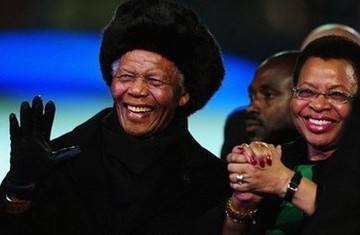
Above: Soccer City was brought to a frenzy on final night as
world icon Nelson Mandela made a grand entrance prior to kick-
off at the 2010 FIFA World Cup Final – Netherlands vs Spain.
The Brookings Institution
By David Gartner, Co-Director, Center for Universal Education
July 19, 2010
With the successful conclusion of Africa’s first World Cup, it remains to be seen what the broader legacy of the event will be for sub-Saharan Africa. While there is justifiably much pride in South Africa’s tremendous work in hosting a major world event, it is not yet clear what will be left behind for Africa’s children. South African President Jacob Zuma rightly argued at an education summit before the final game that there could be no greater legacy than universal primary education across the continent. Yet, the latest figures demonstrate that 32 million children still do not go to primary school in sub-Saharan Africa. Overall levels of international aid to basic education for the region declined after 2007 and have not grown significantly since 2003. Without a much greater and more targeted investment in education in Africa, there is no chance that world leaders will achieve their commitment to universal primary education by 2015.
Despite important progress in a number of key countries, less than 70 percent of children are enrolled in primary school in ten of the poorest Africa countries. In the countries with the largest share of Africa’s out-of-school children, such as Mali, Ghana, Mozambique, Burkina Faso, Niger, Ethiopia and Nigeria, the challenge is often one of reaching poor girls in rural areas who are among the least likely to be in school. A number of countries have shown that it is possible to reach these children by developing strategies that specifically target the barriers to schooling that these children face. For example, in Ethiopia, a strategy of building thousands of schools in rural areas contributed to cutting the number of out of school children by over 3 million. In Burkina Faso, rural schools that offered meals and provided separate bathrooms for boys and girls increased enrollment rates from just 35 to 55 percent. Read more.
FIFA.com
Sunday, July 11, 2010
Merry in Madrid: Spain beats Netherlands, wins World Cup for first time — Sunday 11 July 2010
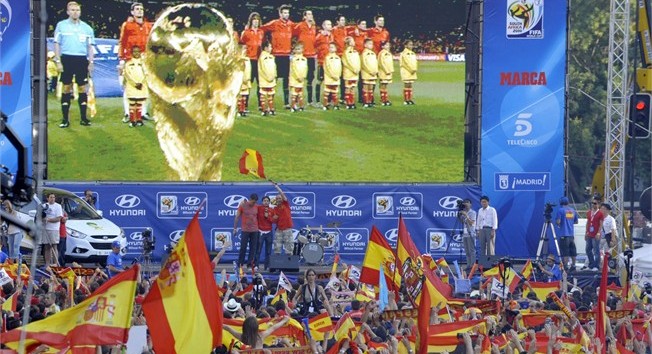
AFP Photo
A thunderous roar erupted across the Spanish capital and fans danced in the streets and chanted “Viva Espana!” as the country’s first ever FIFA World Cup™ trophy sparked a nationwide fiesta. The centre of the capital was a sea of the red and gold national colours as Spain celebrated its agonising 1-0 extra-time win over the Netherlands on Sunday.
The deafening sounds of cheering, klazons, firecrackers and car horns rang out across the city as the FIFA World Cup’s perennial underachievers won the trophy in their first appearance in the Final. In temperatures of 37 degrees Celsius (Fahrenheit), more than 150,000 supporters watched the match on massive screens in a giant fan park in a one-kilometre stretch of the city’s main thoroughfare.
Others crammed into bars or stayed home for the match, which left the country paralysed Sunday evening. Many were wrapped in the Spanish flag, wore the red team shirts or red wigs, or had their faces painted red and gold. Read more.
FIFA – An emotional goodbye at the closing ceremony of the 2010 FIFA World Cup in Soccer City

Soccer City was brought to a frenzy on Sunday night as world icon Nelson Mandela made a grand entrance prior to kick-off at the 2010 FIFA World Cup Final between European giants – Netherlands and Spain.
Madiba magic was broadcast around the world as over half a billion people watched South Africa’s first democratic president, Nelson Mandela, make his way onto the pitch of Soccer City moments after the closing ceremony of the 2010 FIFA World Cup.
From all nations and walks of life there were tears and praises as the reality of seeing the man, affectionately known as Madiba, whose vision and determination brought South Africa to where it is today, rippled through the stadium.
For many the appearance of the iconic figure could not have been more perfect as South Africa bids farewell to the world after 30 days of reveling in the beautiful game that has not only united one nation, but made friends with many.
As the stadium was immersed in darkness, Gripen Fighter Jets reminded fans of 11 June when the Opening Ceremony welcomed the world. Using dramatic lighting displays nine ‘digital comets’, representing the other World Cup stadiums in South Africa, emanated from the Calabash, bringing the focus back to where it all began – Soccer City.
It was a brief walk through time as the anticipation felt in the Opening Ceremony was replaced with a jubilant reflection over the last month, recollecting the fans, on-pitch victories and disappointments and South Africa’s successful hosting of Africa’s first World Cup.
A contemporary display of song, dance and futuristic technology enthralled onlookers as artists including Stoan, Ladysmith Black Mambazo, Africa United (featuring Jozi, Zulu boy, Silkour, 2 Face, Kwesta, Chameleone, Awadi, Krotai and Samini), Abigail Kubeka and South Africa’s Mafikizolo took onlookers on a journey that rejoiced in the African spirit of the World Cup.
Even the call of the vuvuzela was celebrated, as dancers performed to the World Cup anthem Waka Waka sung by Colombian artist Shakira and local band Freshly Ground, which all but got the stadium on its feet.
The final curtain to an event that took the world by surprise left mixed emotions. While it’s the end of the World Cup in South Africa, it is the beginning of a new chapter for the people and continent of Africa, as relationships that were formed here are nourished into friendships that will last a lifetime.
As the stadium lights came back on and the wait for the game that will crown the new world champions drew to a close, the hopes and dreams of a nation begins to shift to a new dawn, knowing that everyone who chose to join in South Africa’s celebration leaves with a little more “African-ess” in them.
Shakira: I’m feeling the love — Interview with the artist at FIFA.com — Saturday 10 July 2010
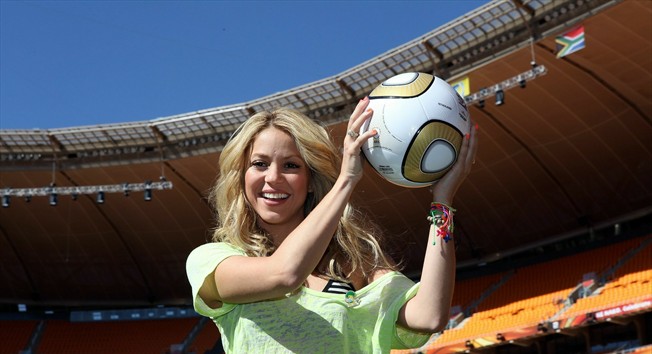
After performing at the kick-off concert for this FIFA World Cup™, Shakira will also contribute to Final day in South Africa when she sings the official tournament anthem, Waka Waka (This Time for Africa), before the players of Netherlands and Spain take the field at Soccer City.
The Colombian pop singer, who also performed prior to the 2006 Final in Germany, took time out from rehearsing to reflect on an “inspiring” month and explain to FIFA.com why she is rooting for Spain and why she has fallen in love with both football and her South African hosts. Read more.
Watch: Shakira Video – The Official 2010 South Africa FIFA World Cup Tournament Anthem
FIFA.com: A Look back at finals that left their imprint in FIFA World Cup history —- July, 2010
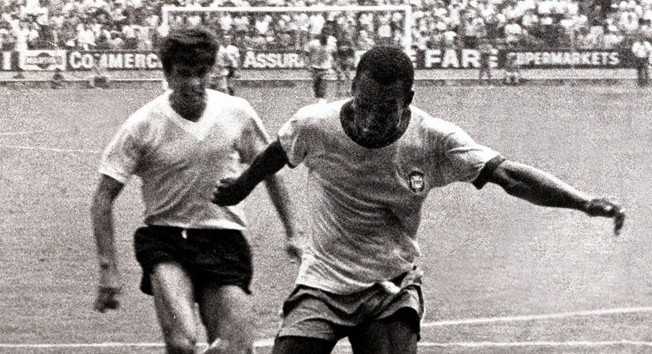
The Final of the 2010 FIFA World Cup South Africa™ has already reserved itself a place in the history books as the victors are set to join the select band of previous world champions. With the Netherlands and Spain now making their last preparations, FIFA.com looks back at the showpiece matches from years gone by that helped shape the beautiful game.
Uruguay-Argentina, Uruguay 1930 (4-2)
The Estadio Centenario was the venue for the maiden FIFA World Cup Final between the hosts and Argentina, and the locals must have feared the worst at half-time as La Albiceleste went in boasting a 2-1 lead. Staring at defeat, Uruguay seized the upper hand after the restart and found the net through Pedro Cea, Victoriano Iriarte and Hector Castro to receive the Trophy from Jules Rimet himself. The following day was unsurprisingly declared a national holiday in Uruguay to allow the people to celebrate the landmark win in style.
Uruguay-Brazil, Brazil 1950 (2-1)
Following Italy’s triumphs on European soil in 1934 and 1938, the FIFA World Cup returned to South America in 1950, with Brazil charged with hosting the event. A Seleção were naturally determined to claim glory on home soil and took the lead two minutes after the break, but the 173,850 fans packed into the Maracana Stadium in Rio de Janeiro were about to be silenced as Juan Schiaffino and Alcides Ghiggia turned the match around for Uruguay. Considered one of the biggest upsets in the tournament’s history, this game lives on in Brazilian folklore as the Maracanazo, the tragedy of the Maracana.
West Germany-Hungary, Switzerland 1954 (3-2)
Known universally as the ‘Miracle of Berne’, the 1954 Final ended in an unlikely victory for West Germany over the heavy favourites. The ‘Magical Magyars’ looked set to live up to their billing when they raced into a 2-0 lead through Ferenc Puskas and Zoltan Czibor, but Max Morlock and Helmut Rahn soon put the outsiders back on level terms before Rahn delivered what proved the decisive blow with six minutes remaining. The result was met with rapturous joy back in West Germany, where people were tuned in to the exuberant radio commentary of Herbert Zimmermann. His passionate burst of emotion at the final whistle has long since become the stuff of legend: “Over, over, over! The game is over! Germany are world champions after beating Hungary 3-2.”
Brazil-Sweden, Sweden 1958 (5-2)
Brazil finally joined the elite group of world champions thanks largely to the efforts of a youthful Pele in 1958. Having earned his side a place in the showpiece game thanks to a hat-trick against France in the semi-finals, Edson Arantes do Nascimento became the youngest ever player to register in the Final with a pair of strikes aged 17 and 249 days. His first, and Brazil’s third, was a thing of beauty and one of the most recognisable goals in the history of the game, O Rei collecting the ball in the area, flicking it over a defender and beating the goalkeeper with a thumping volley. Pele then rounded off the scoring in the last minute to secure A Seleção the first of their five FIFA World Cup crowns.
England-West Germany, England 1966 (4-2 a.e.t.)
Alfred Hitchcock himself would have been proud of the twists and turns offered up by the 1966 Final as England downed West Germany after extra time to lift themselves to the global summit for the one and only time in their history. The hosts had looked destined to sew things up in normal time until Wolfgang Weber made it 2-2 with a minute to go, but Geoff Hurst ensured they would not be denied by notching two more efforts in extra time to become the first player to plunder a hat-trick in a FIFA World Cup Final. The fans at Wembley Stadium greeted his third by racing on to the pitch to salute their hero.
Netherlands-West Germany, West Germany 1974 (1-2)
Having settled into such a majestic rhythm on their route to the Final, few doubted that the Oranje were about to savour their maiden FIFA World Cup success. Rinus Michels’s charges went into the last game unbeaten and fresh from seeing off holders Brazil thanks to goals from Johan Neeskens and Johan Cruyff, and they quickly went ahead from the penalty spot. Neeskens converted just a minute and a half into the match to grab the fastest ever goal in a FIFA World Cup Final, but he and his team-mates were pegged back when Paul Breitner also struck from the spot. It was then left to iconic marksman Gerd Muller to shatter Dutch dreams close to half-time, his goal enough to secure Die Nationalmannschaft their second world title. The Netherlands fell short at the final hurdle against Argentina four years later and will be hoping for a case of ‘third time lucky’ this evening.
West Germany-Argentina, Italy 1990 (1-0)
This encounter was a rematch of the 1986 Final, when Diego Maradona and Co gifted Argentina their second success, but this time the outcome would be very different. With Franz Beckenbauer in the dugout, West Germany snatched the slenderest of triumphs courtesy of an Andreas Brehme penalty five minutes from time. As Die Nationalmannschaft celebrated their third FIFA World Cup crown, Der Kaiser could pride himself on having matched the feat of Brazil’s Mario Zagallo by becoming only the second man to hoist the coveted Trophy aloft as both player and coach.
Brazil-France, France 1998 (0-3)
Four years after adding a fourth star to their shirts, Brazil advanced to yet another Final intent on clinching their fifth global title. They were about to have those plans utterly spoiled, however, as Aime Jacquet’s men subjected the South Americans to a heavy 3-0 loss. Zinedine Zidane did much of the damage with a pair of headers from corners and Emmanuel Petit put the seal on a commanding win late on as France took up membership of the club reserved for previous winners. The images of a sea of people on the Champs-Elysees that July evening and the euphoria of then President Jacques Chirac will live long in the memory.
Germany-Brazil, Korea/Japan 2002 (0-2)
The first showpiece game to be held beyond European or South American shores belonged to Brazil’s Ronaldo, the powerful striker helping himself to both goals to clinch Brazil their fifth world title and earn himself the adidas Golden Boot. A Canarinho full-back and captain Cafu also wrote his name into the annals of the game by appearing in his third FIFA World Cup Final, while for both sides on display it was their seventh overall.





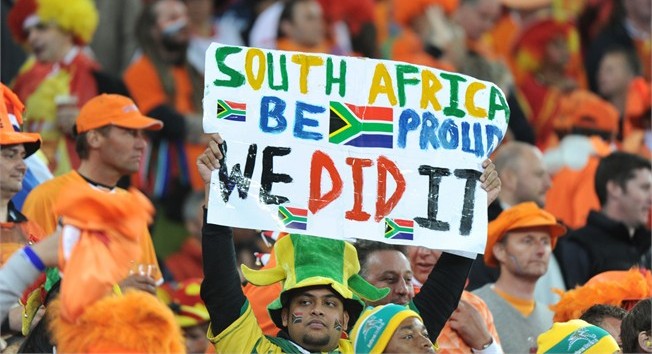





















1 Response to “A World Cup Education Legacy for Africa?”